
Where next for Scotland as the Nicola Sturgeon era ends?
Last summer, the outgoing first minister proposed 19 October 2023 as the date when, for the second time in nine years, voters would be asked "Should Scotland be an independent country?"
The plan she set out in Edinburgh was thwarted by politicians and judges in London.
The Conservative prime minister Boris Johnson refused to recognise a pro-independence majority in the Scottish Parliament - the accepted trigger for the first referendum in 2014 - as a mandate for a second vote.
Then, in November, the UK Supreme Court ruled that the Scottish Parliament did not have the power to organise its own referendum without Westminster's approval.
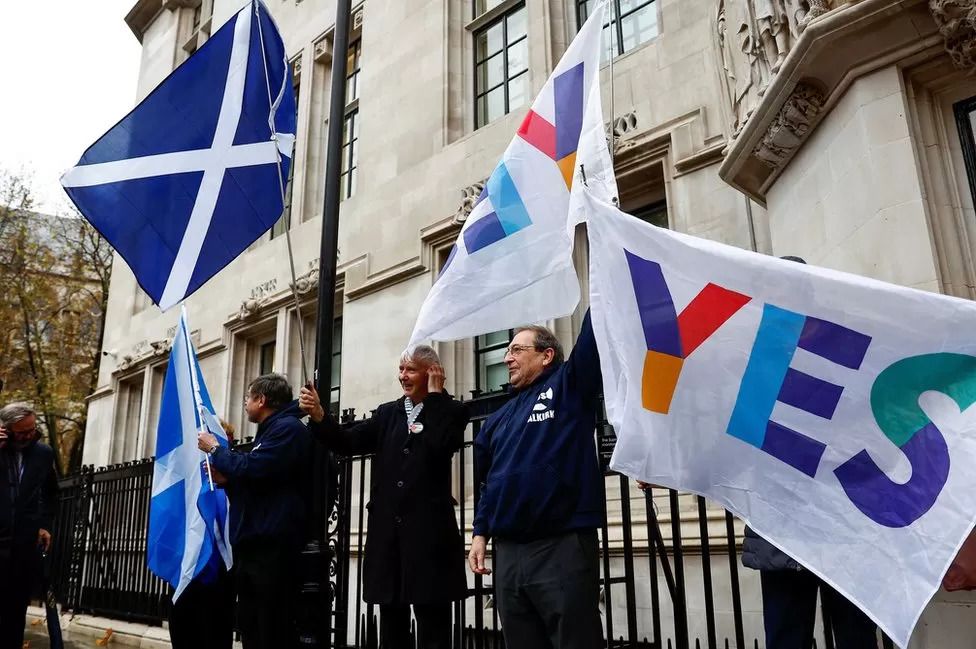 The Supreme Court issued its ruling on the indyref2 case in November 2022
The Supreme Court issued its ruling on the indyref2 case in November 2022
The judgment laid bare the true nature of the 1707 union which created the state of Great Britain. While theoretically a marriage of equals, one partner, it seemed, could not leave without the other's consent.
Ms Sturgeon had run out of road and she knew it.
After briefly flirting with the idea of treating the next general election as a referendum in all but name, she announced her resignation less than three months after the court ruling.
Her departure marks the end of a remarkable career as a political campaigner.
"Eight election victories in eight years as first minister, that's the verdict that matters to me," said Ms Sturgeon in her 286th and final session of First Minister's Question Time on Thursday.
Triumphs in three general elections, two Holyrood elections, two local government elections, and a European parliamentary election are impressive for sure - but, unusually for a political party, winning elections to enact policies in government is not actually the central mission of the SNP.
On the binary measure of independence, Ms Sturgeon, like Alex Salmond before her, leaves office as a failure. Scotland remains in the United Kingdom.
She began campaigning for independence as a teenager in 1980s Ayrshire and was just 21 when she first stood for election, unsuccessfully challenging Labour in the working class Glasgow Shettleston constituency under the SNP slogan "Free by '93".
Thirty years on, the SNP has made great strides towards its goal but Ms Sturgeon's resignation implicitly acknowledges that Scotland will not be "free" by '23, or any time soon after.
The abrupt announcement of her departure set in train a damaging and divisive leadership contest, with splits emerging on economic and social issues as well as on electoral and constitutional strategy.
Discipline, for which the SNP had been famed, began to crumble.
Even contenders for Ms Sturgeon's crown publicly criticised the lack of progress on independence during her eight years in office.
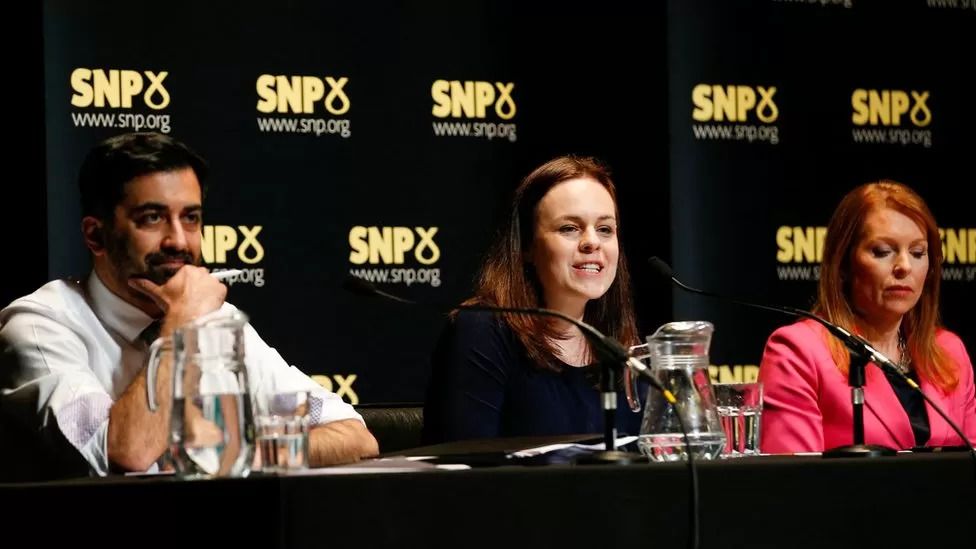 Humza Yousaf, Kate Forbes and Ash Regan are competing to become the next SNP leader
Humza Yousaf, Kate Forbes and Ash Regan are competing to become the next SNP leader
"For too many years, we've become the party of referendums rather than the party of independence," said Finance Secretary Kate Forbes, who promises to "turn a divided nation into a settled majority" for leaving the UK.
According to former minister Ash Regan: "The SNP has lost its way. There's been no progress on independence in the last few years, despite the worst UK governments of all time."
"I think what we are now hearing publicly is what many people have been saying privately for a long time," says James Mitchell, professor of public policy at Edinburgh University.
The SNP's looming crisis deepened when the party admitted that it had covered up a dramatic fall in its membership, prompting the resignations of director of communications, Murray Foote, and chief executive Peter Murrell, who is married to Ms Sturgeon.
Also following his wife out of government are two of her most trusted lieutenants, senior adviser Liz Lloyd and Deputy First Minister John Swinney.
It has been a chaotic and painful few weeks for the SNP and yet the final days of the first minister's tenure have been characterised by boosterism and denial.
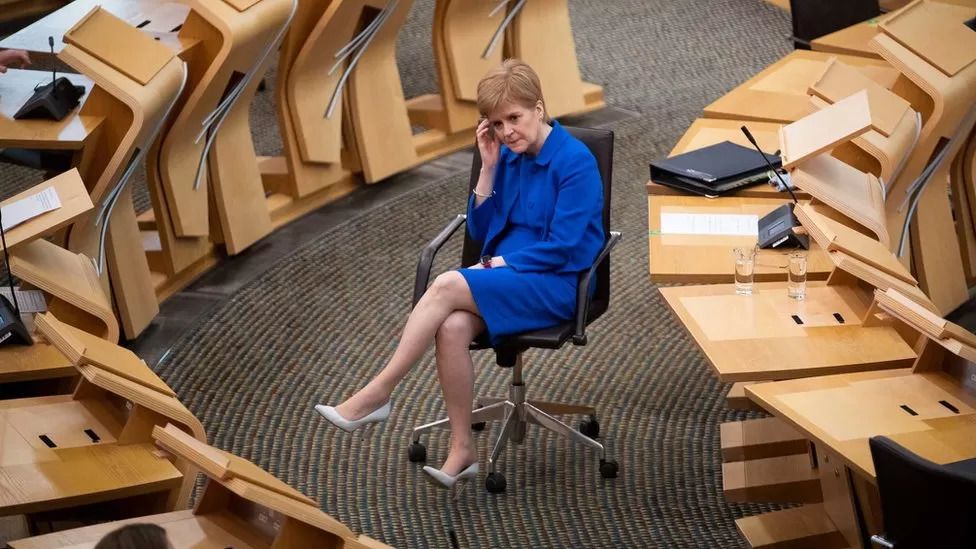
"The SNP's not in a mess," Ms Sturgeon insisted on ITV's Loose Women. "It's going through, how can I put this, some growing pains right now."
"Surely 'shrinking pains'," said Prof Mitchell on Twitter.
Then there was her denial that SNP president Mike Russell had said the party was in a mess.
Mr Russell had answered the question "Is your party in turmoil?" with the words: "Well, I think it's fair to say that there's a tremendous mess and we have to clear it up."
Ms Sturgeon also insisted that her party had not lied to journalists about its plummeting membership figures despite evidence to the contrary, not least the resignations of Mr Foote and Mr Murrell.
The whole membership affair was, leadership contender and Health Secretary Humza Yousaf told Tuesday's Times Radio debate, a "total own goal".
So, is Nicola Sturgeon's dream of a sovereign Scottish state, standing tall on the world stage, dead and buried?
History says don't be so sure.
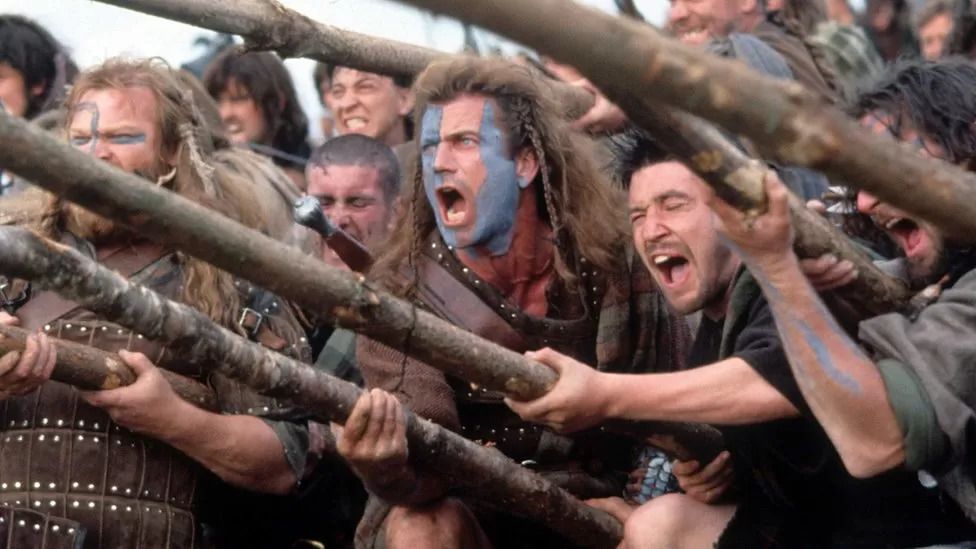 Hollywood epic Braveheart was released in 1995
Hollywood epic Braveheart was released in 1995
On the day the Hollywood epic Braveheart had its American premiere in Seattle, a more peaceful political drama was playing out on the streets of the old country.
The death of the Conservative MP for Perth and Kinross had triggered a by-election, and the SNP candidate Roseanna Cunningham was on the march - and under attack.
A senior Tory accused Ms Cunningham - caricatured as Republican Rose because she opposed the monarchy - of fighting a campaign "against Queen and country".
At 18 years old, I was easily the least experienced journalist on the by-election trail - but even I could see that the Tories were in trouble in territory which they had dominated for decades.
Their candidate, a gaffe-prone merchant banker, was keen to talk about one topic above all others, campaigning (literally) under the banner: "A Strong Union".
You could understand why. The spoils of Empire; the unifying experience of defying Hitler's Germany; and the creation of the welfare state had all bound Scotland tightly into the union.
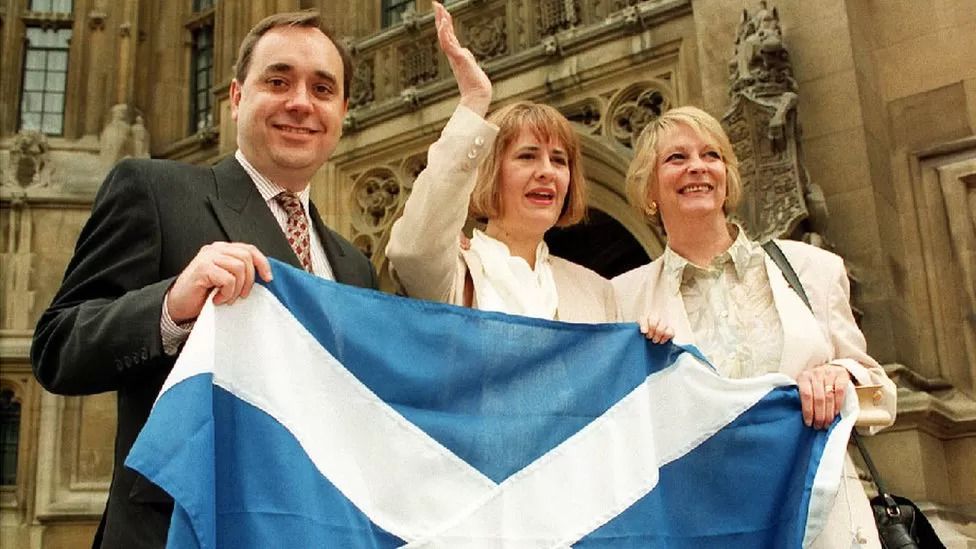 Roseanna Cunningham (centre) put independence at the heart of her by-election campaign in 1995
Roseanna Cunningham (centre) put independence at the heart of her by-election campaign in 1995
But the post-war period was marked by British decline, epitomised by the humiliations of Suez in 1956 and the economic bailout of 1976.
Margaret Thatcher's response, as Conservative prime minister during the 1980s, was to fight and win a war abroad while hastening a profound economic shift at home.
Her vision of a modern British economy meant moving away from state subsidy of heavy industry; weakening the trade unions; and encouraging the creation of wealth through private enterprise.
For many in Scotland, where culture, tradition and pride were intertwined with coal, steel and textiles, the pace of change was bewildering.
A lack of direct and obvious benefit from the vast quantities of oil being sucked out of the North Sea also contributed to a rise in nationalist sentiment.
By the time of the Perth and Kinross by-election, Scotland was rediscovering an old identity.
When it premiered in Stirling that autumn, Braveheart's romanticisation of the wars of independence from England in the 13th and 14th Centuries seemed in tune with the mood of the moment.
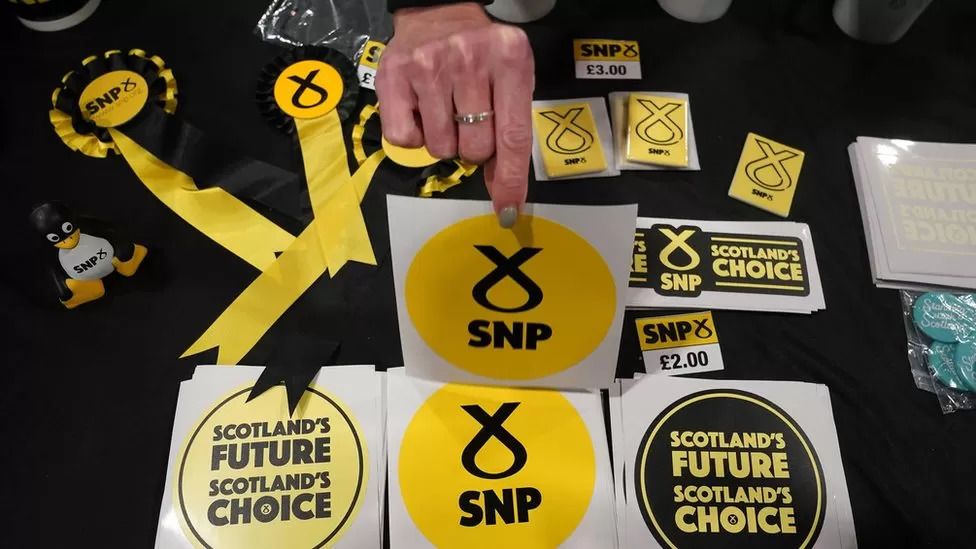
Having placed independence front and centre in her campaign, Ms Cunningham won handsomely, further reducing Tory Prime Minister John Major's slender majority in the House of Commons.
"Scotland is waking from its slumber," proclaimed the victorious new MP during a feisty and raucous declaration in the city hall.
Was it though? The SNP had scored spectacular by-election successes before — Motherwell in 1945; Hamilton in 1967; and Glasgow Govan in 1973 and 1988 — only to lose each seat at the subsequent general election.
This time was different. Perth remains SNP territory to this day.
The party may be in trouble now but, with large majorities of younger voters telling pollsters that they support independence, the constitutional question which hangs over Scottish politics is not going away.
It is a question which Labour, a party forged in the din of Scotland's industrial revolution, has tussled with since its creation.
The Scottish Labour Party was founded in 1888 by two extraordinary but very different men, the miner and trade unionist Keir Hardie, and the aristocratic adventurer RB Cunninghame Graham.
Hardie went on to become the first leader of the UK Labour Party in 1906; Cunninghame Grahame the first president of the Scottish National Party in 1934.
The most fundamental change to Scottish governance in the democratic era was delivered by Labour when the Scottish Parliament took charge of domestic affairs such as health and education in 1999.
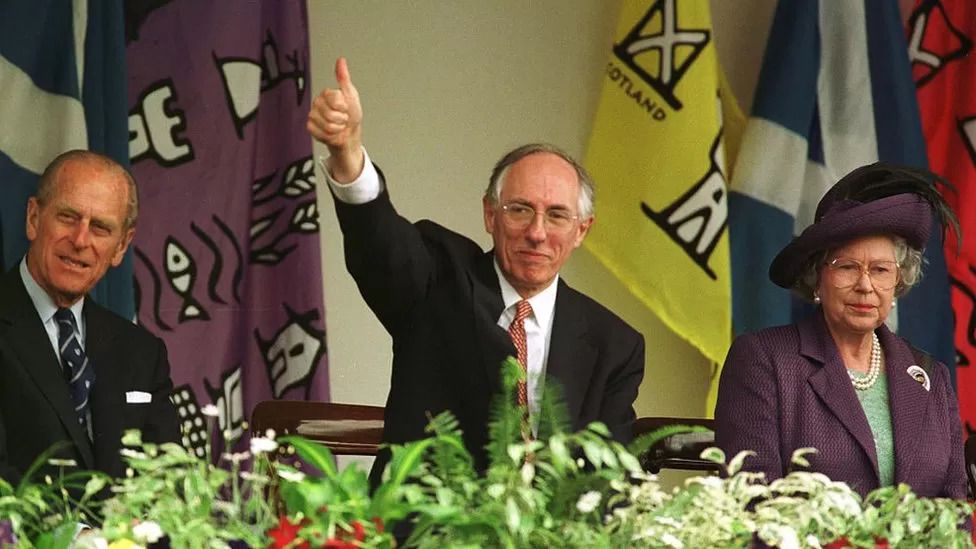 Labour's Donald Dewar was the first first minister of Scotland when the Scottish Parliament opened in 1999
Labour's Donald Dewar was the first first minister of Scotland when the Scottish Parliament opened in 1999
Nearly a quarter of a century later, Labour is led by Keir Hardie's namesake, Sir Keir Starmer, who spies an opportunity in the SNP's travails.
On Friday I accompanied Sir Keir, Scottish Labour leader, Anas Sarwar and shadow climate change and net zero secretary, Ed Miliband on a trip to SSE's Beatrice wind farm off the east coast of Caithness.
The leader of the opposition at Westminster was in buoyant form, and no wonder.
His party sees the departure of multiple election winner Nicola Sturgeon — whom he calls a "giant in Scottish politics" — as great news.
"The SNP is imploding," he told me on the harbour side at Wick. "I think everybody can see that."
The party, he added, "has run out of road when it comes to the case for independence and that's shone a light on their record".
With a large and sustained polling lead across the UK, and signs of improvement in Scotland, Labour may be in a positive place but the path to Downing Street is not straight and clear, running through mixed terrain.
First, there is the cosmopolitan and multicultural domain of London and other big English cities.
Then there are the more socially conservative, Brexit-inclined "red wall" seats, in the Midlands and the north of England, which switched from Labour to Boris Johnson's Conservatives at the last general election.
Finally there is the party's old Scots fiefdom, stretching from Ayrshire in the west through the central belt to Fife in the east, where the SNP have dominated with a pro-independence, pro-European message since 2015.
The SNP hold 45 of the Scottish 59 seats at Westminster (two more have defected to Alex Salmond's Alba Party since the last general election) but Labour strategists now reckon at least 15 of those would be competitive based on current polling, particularly in Glasgow, Fife, Midlothian and East Lothian.
With that in mind, on this trip Sir Keir appears to have adopted the doctor's maxim: first, do no harm. In our interview he uses the word "humility" a lot.
"I think Labour lost its way and got too far from voters here in Scotland and that's why I've spent a lot of time in Scotland listening, engaging, talking about the future," he says.
Precisely what he means by getting too far from the voters is not terribly clear.
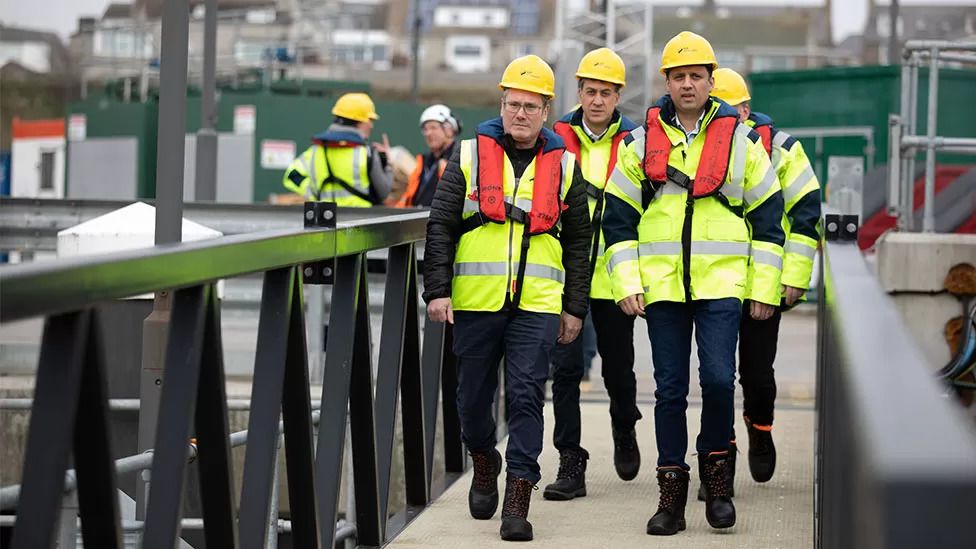 Sir Keir Starmer, Ed Miliband and Anas Sarwar travelled to the Beatrice wind farm off Caithness on Friday
Sir Keir Starmer, Ed Miliband and Anas Sarwar travelled to the Beatrice wind farm off Caithness on Friday
How would he respect the democratic will of the Scottish people to remain in the European Union, and the pro-independence majority in the Scottish Parliament?
The real answer to both questions is, he won't. But that would sound harsh so he adopts softer language.
On Brexit he says: "If you want a closer relationship with the EU, I hear you, I agree with you and we will set about ensuring that we do have that close relationship."
On independence he rejects "breaking up the United Kingdom," while recognising that there is a "desire for change".
Labour's attempt to defuse independence as an issue is to acknowledge an asymmetry in political and economic power between the prosperous south east of England and other parts of the UK, which it proposes to tackle by embracing some of the recommendations in Gordon Brown's recent commission on the UK's future, while considering whether to adopt others.
Already on Labour's agenda are House of Lords reform; decentralisation of economic power to the nations and regions of the UK; and improved intergovernmental working between the various administrations of these islands.
"Decisions should be made by people most closely affected by those decisions," says Sir Keir.
Isn't that an argument for independence?
No, he insists, it's an argument for local decision-making within the UK framework.
"The people in the Highlands can make decisions in partnership with the Labour government about the future living standards here, the future jobs, the skills we're talking about this morning," he explains.
Aware of this looming Labour threat, the SNP is keen to conflate Sir Keir's party with Rishi Sunak's, reminding voters that Labour and Tories joined together in the Better Together campaign against independence in 2014.
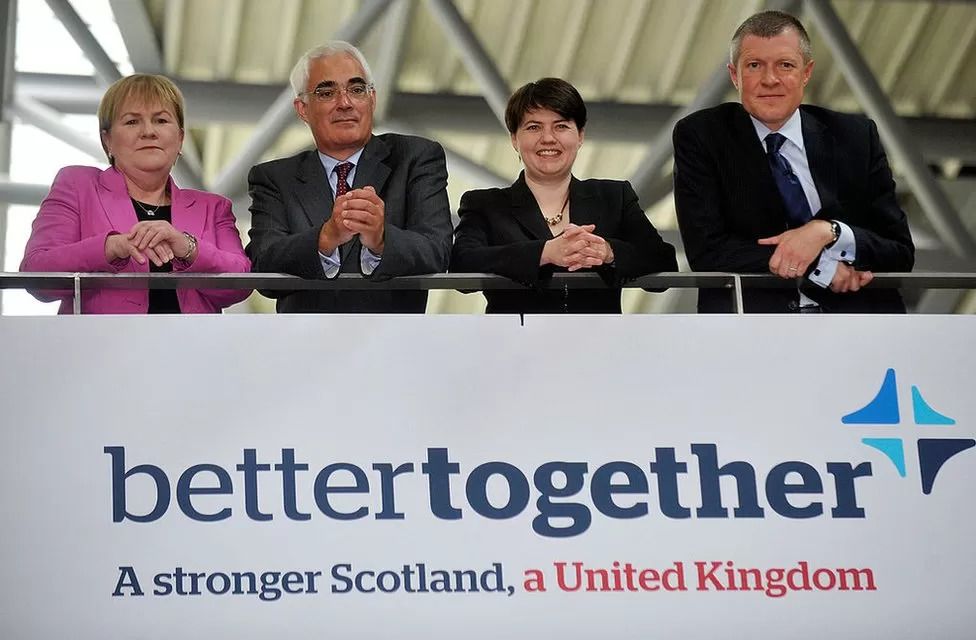 Labour politicians joined Conservative and Liberal Democrat counterparts to campaign for the union ahead of the 2014 referendum
Labour politicians joined Conservative and Liberal Democrat counterparts to campaign for the union ahead of the 2014 referendum
Sir Keir's decision to approvingly quote Margaret Thatcher in a speech on crime while in Stoke this week makes the SNP's job easier while underlining the Labour leader's difficulty in assembling such a diverse electoral coalition.
Still, he can take comfort that his opponents here also face immense challenges.
The new SNP leader will have to tackle deep-rooted problems in Scotland's public services which are costing and blighting lives.
He or she will also be under pressure to set out a credible route map towards — and a credible plan for — independence.
And the winner must also reunite a divided party in time for a general election expected to be held next year in which, it is now clearer than ever, Scotland will be a key battleground.











